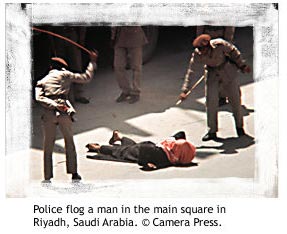Saudi Arabia, July 25 2005
NRI press
NRI (non-resident Indian) was executed (beheaded
by the sword) in the Saudi capital Riyadh on Monday
by Saudi Govt. Soper Amani Rafi was found guilty of
"stabbing to death Mohammad bin Siddiq Ashfak
Ashraf with a knife as he slept because of a dispute
between them.

This year already at least 55 the number of people
put to death in the kingdom this year, compared to
35 in 2004 and 53 in 2003.
Saudi Arabia has one of the highest rates of executions
in the world in both absolute numbers and per capita.
The death penalty applies to a wide range of non-violent
activities such as apostasy and "witchcraft",
"sexual offences", acts deemed to amount
to "corruption on earth", and crimes such
as drug dealing.
More than 1,100 people have been executed in the
past 20 years, although the true total is probably
far higher. It is almost certain that all were sentenced
to death after secret and summary hearings and with
no meaningful appeal.
Often, the first warning prisoners have of their
imminent execution is when they are taken out of their
cell in handcuffs on a Friday, the day executions
are normally carried out. They are taken to a public
square, blindfolded and forced to kneel. The executioner
raises a sword, then brings the blade down across
the prisoner's neck. Sometimes more than one stroke
is needed to sever the head. A doctor certifies that
the prisoner is dead, then the body and head are removed
and buried.
It does not know whether they are allowed to see
a representative of their religious faith, or whether
an appropriate religious ceremony is conducted before,
during or after death. What it does know is that foreign
nationals are rarely if ever allowed to see their
loved ones before they are executed and are never
given advance warning of their execution.
Historical background.
Beheading with a sword or axe goes back a very long
way in history, because like hanging, it was a cheap
and practical method of execution in early times when
a sword or an axe was always readily available.
The Greeks and the Romans considered beheading a less
dishonourable (and less painful) form of execution
than other methods in use at the time. The Roman Empire
used beheading for its own citizens whilst crucifying
others.
Beheading was widely used in Europe and Asia until
the 20th century, but now is confined to Saudi Arabia,
Qatar and Yemen and Iran